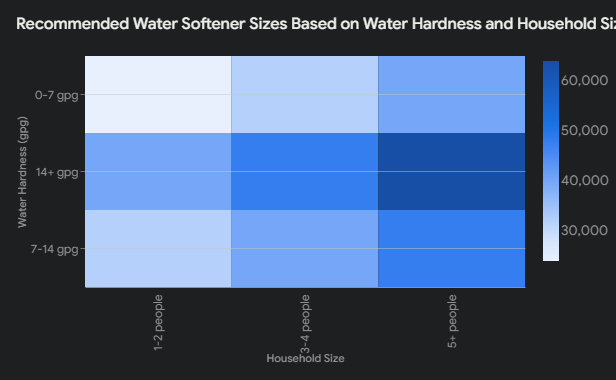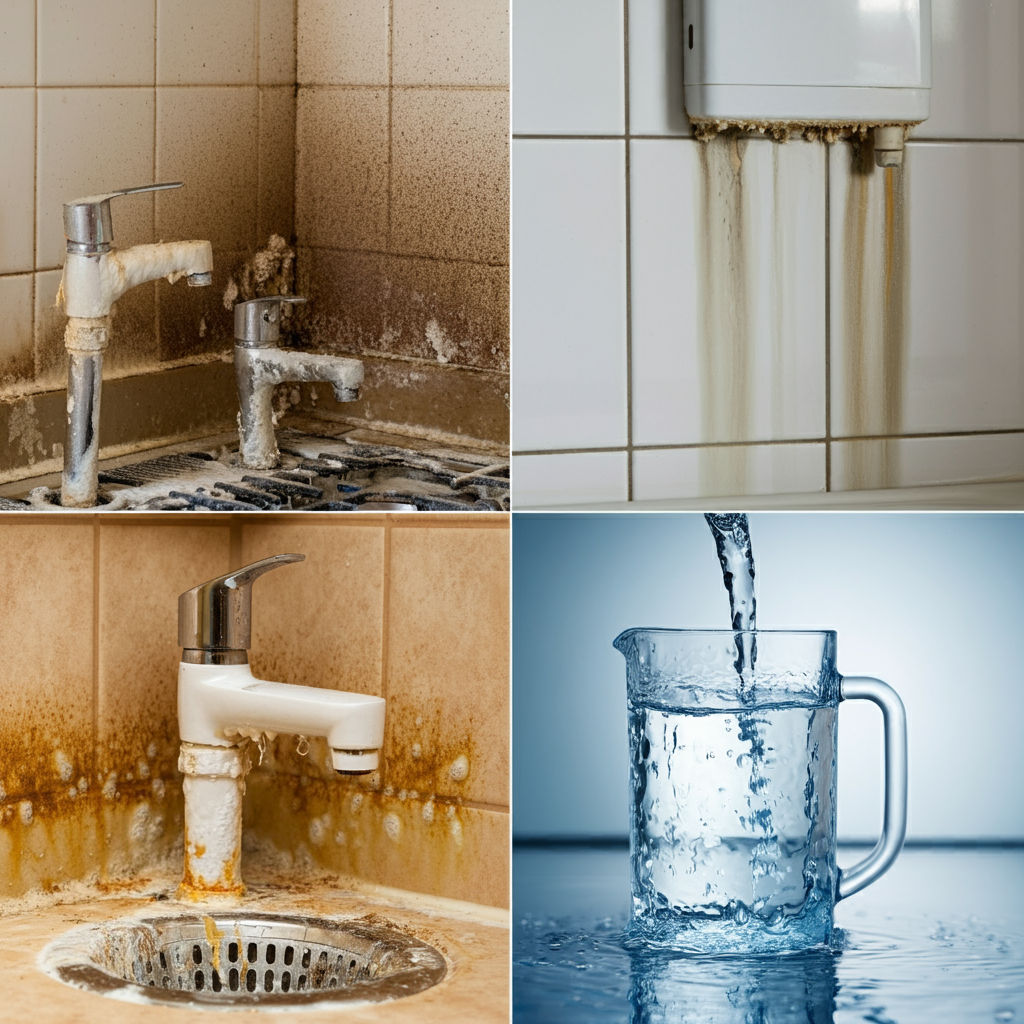The recommended water softener size for your home depends on two crucial factors: your water’s hardness level and your daily water usage. At WaterSoftenerSizing.com, we understand that choosing the right size can be confusing. An incorrectly sized unit can lead to inefficient softening, wasted salt, and even damage to your appliances and plumbing. That’s why we’re here to guide you through the process, ensuring you invest in a water softener that delivers optimal results and long-term value. Water hardness, a measure of dissolved calcium and magnesium in your water supply, is the primary culprit behind issues like scale buildup, soap scum, dry skin, and fading laundry. It’s measured in grains per gallon (GPG) and can range from soft (0-3 GPG) to very hard (15+ GPG). Your household’s daily water usage, on the other hand, depends on the number of people in your home and their water consumption habits. To achieve perfectly softened water and avoid costly mistakes, it’s essential to match your water softener’s capacity with your specific needs. A water softener that’s too small won’t effectively remove hardness minerals, while an oversized unit will waste salt and energy. Our goal is to empower you with the knowledge and tools necessary to make an informed decision, ensuring you enjoy the benefits of soft water without overspending. Throughout this comprehensive guide, we’ll delve into the science behind water softening, explain how to determine your water hardness and daily usage, and provide detailed recommendations for water softener sizes based on various hardness levels and household sizes. We’ll also discuss the importance of consulting a professional, choosing the right brand, and maintaining your water softener for optimal performance. By the end of this article, you’ll be equipped with the expertise to select the perfect water softener for your home, ensuring a continuous supply of soft, luxurious water that enhances your daily life and protects your valuable appliances and plumbing.
Understanding Water Hardness: The Key to Proper Softener Sizing
Water hardness, the concentration of dissolved minerals – primarily calcium and magnesium – in your water supply, is the root cause of many household frustrations. Measured in grains per gallon (GPG), water hardness determines how much of these minerals are present in your water, ranging from soft (0-3 GPG) to very hard (15+ GPG).
Soft vs. Hard Water: A Tale of Two Taps
Soft water, with its low mineral content, lathers easily with soap, leaves your skin feeling smooth and your hair silky, and prevents the buildup of limescale in your appliances and pipes. Hard water, on the other hand, can be a real nuisance. It reacts with soap to form a sticky residue known as soap scum, leaves your skin feeling dry and itchy, and can wreak havoc on your appliances, leading to reduced efficiency, costly repairs, and even premature failure.
The Water Quality Association (WQA), a leading authority on water treatment, classifies water hardness into five categories:
- Soft (0-3 GPG): Virtually no hardness minerals.
- Slightly Hard (3-7 GPG): Some noticeable effects, like reduced lathering and minor scaling.
- Moderately Hard (7-10 GPG): Significant soap scum, noticeable scaling, and potentially reduced appliance efficiency.
- Hard (10-15 GPG): Severe scaling, soap scum buildup, and potential for appliance damage.
- Very Hard (15+ GPG): Extensive scaling, soap scum, and a high risk of appliance damage.
Testing Your Water Hardness: Unlocking the Key to Soft Water
Determining your water’s hardness level is the first step in choosing the right water softener size. You can easily test your water at home using a simple test kit, or you can contact your local water municipality for a water quality report. Many municipalities publish this information online or will provide it upon request. At WaterSoftenerSizing.com, we recommend testing your water annually, as hardness levels can fluctuate due to factors like seasonal changes or shifts in the water source. Armed with accurate data, you can confidently select a water softener that meets your specific needs and ensures a continuous supply of soft, refreshing water for your home.
How Water Softeners Work: Demystifying the Softening Process
Water softeners are ingenious appliances designed to transform hard water into soft, luxurious water through a process called ion exchange. Imagine a microscopic dance where calcium and magnesium ions, the culprits behind hardness, are swapped out for sodium ions, leaving your water soft and scale-free.
Ion Exchange: The Heart of Water Softening
Ion exchange is a chemical reaction where ions with the same charge are exchanged between two substances. In a water softener, this exchange occurs within the mineral tank, which is filled with tiny resin beads. These beads carry a negative charge and are coated with sodium ions. As hard water flows through the mineral tank, the calcium and magnesium ions, which have a stronger positive charge than sodium, are attracted to the negatively charged resin beads. They stick to the beads, releasing the sodium ions into the water. This exchange effectively removes the hardness minerals, leaving you with soft water.
Components of a Water Softener: The Softening Ensemble
A typical water softener comprises three main components:
- Mineral Tank (Resin Bed): This is where the magic of ion exchange happens. The tank is filled with resin beads that capture and hold the hardness minerals.
- Brine Tank (Salt Storage): This tank holds a highly concentrated salt solution (brine) used in the regeneration process. The salt replenishes the sodium ions on the resin beads, preparing them for the next softening cycle.
- Control Valve: This valve, often referred to as the “brain” of the softener, manages the entire softening and regeneration process. It monitors water usage, initiates regeneration cycles, and controls the flow of water and brine.
Regeneration Cycle: The Softener’s Refreshing Ritual
Over time, the resin beads in the mineral tank become saturated with calcium and magnesium ions, losing their ability to soften water. This triggers the regeneration cycle, a multi-stage process where the softener cleanses itself and recharges the resin beads. During regeneration, the control valve flushes the mineral tank with brine from the salt storage tank. The high concentration of sodium ions in the brine displaces the calcium and magnesium ions from the resin beads, restoring their softening capacity. The wastewater, now laden with hardness minerals, is then flushed out of the system, and the softener returns to service, ready to tackle hard water once again.
Salt-Based vs. Salt-Free: A Tale of Two Technologies
While salt-based water softeners are the most common and effective, salt-free systems, also known as water conditioners, offer an alternative for those concerned about sodium intake or environmental impact. However, it’s important to note that salt-free systems do not remove hardness minerals; they alter their structure to prevent scale buildup. This makes salt-based softeners a superior choice for comprehensive hard water treatment.
How to Determine the Right Water Softener Size
Choosing the correct water softener size is crucial for efficient and cost-effective water treatment. A softener that’s too small will regenerate too frequently, wasting salt and energy, while an oversized unit will operate inefficiently, leading to higher operating costs. At WaterSoftenerSizing.com, we believe in empowering you with the knowledge and tools to make informed decisions. That’s why we offer a free, user-friendly water softener sizing calculator that takes the guesswork out of the process. However, understanding the underlying factors will help you make the most of our calculator and ensure you select the ideal softener for your needs. 
The Two Key Factors: Water Hardness and Daily Usage
The recommended size of your water softener hinges on two essential variables:
- Water Hardness Level (GPG): As discussed earlier, water hardness levels vary significantly. The higher your water hardness, the greater the softener’s capacity needs to be to effectively remove the minerals.
- Daily Water Usage (Gallons): This refers to the total amount of water your household consumes each day. Factors influencing water usage include the number of people in your household, the number of bathrooms, and your daily routines (e.g., showering, laundry, dishwashing).
Estimating Daily Water Usage: A Simple Calculation
A good starting point for estimating your household’s daily water usage is to multiply the number of people in your home by 75 gallons per person. For example, a family of four would use an estimated 300 gallons of water per day (4 people x 75 gallons/person). However, this is just an estimate. Your actual water usage may be higher or lower depending on your habits and the efficiency of your appliances. If you have high-efficiency toilets, showerheads, or washing machines, your water usage might be lower. The most accurate way to determine your water usage is to check your water bill. Most bills will show your usage in gallons or cubic feet. You can also use a water meter to track your daily usage.
Sizing Formula: Calculating Your Softener Needs
To calculate your required softener capacity, you’ll need to consider your daily water usage, water hardness, and the desired regeneration frequency. A general guideline is to size your softener to regenerate every 3-7 days. Here’s a simplified formula: Daily Softening Requirement (grains) = Daily Water Usage (gallons) x Water Hardness (GPG) For example, if your household uses 300 gallons of water per day and your water hardness is 10 GPG, your daily softening requirement would be 3,000 grains. To ensure your softener can handle peak usage and provide a buffer for regeneration, we recommend multiplying your daily softening requirement by 7-10. This will give you a good estimate of the total softener capacity you need in grains.
Water Softener Sizing Calculator: Your Personalized Solution
At WaterSoftenerSizing.com, we’ve developed a user-friendly water softener sizing calculator to simplify the process. Simply enter your water hardness, household size, and other relevant details, and our calculator will instantly provide you with a personalized softener size recommendation.
Recommended Water Softener Sizes by Water Hardness Level
Now that we understand the factors that influence water softener sizing, let’s dive into specific recommendations for different water hardness levels and household sizes. Keep in mind that these are general guidelines, and your ideal softener size may vary depending on your unique water usage patterns and specific needs.
Water Softener Sizing Table
| Water Hardness (GPG) | Household Size (people) | Recommended Softener Size (grains) |
| 3-7 | 1-2 | 24,000 |
| 7-10 | 1-2 | 32,000 |
| 10-15 | 1-2 | 48,000 |
| 3-7 | 3-4 | 32,000 |
| 7-10 | 3-4 | 48,000 |
| 10-15 | 3-4 | 64,000 |
| 3-7 | 5-6 | 48,000 |
| 7-10 | 5-6 | 64,000 |
| 10-15 | 5-6 | 80,000 |
Interpreting the Table: Finding Your Fit
This table provides a general overview of recommended water softener sizes based on a combination of water hardness and the number of people in your household. It’s important to note that this table assumes average water usage patterns. If your household consumes significantly more or less water than average, you may need to adjust the recommended size accordingly. For example, a family of four with moderately hard water (7-10 GPG) would typically need a water softener with a capacity of 48,000 grains. However, if they have multiple bathrooms, frequently use water-intensive appliances like washing machines and dishwashers, or have guests staying over regularly, they might need to consider a larger unit.
Fine-Tuning Your Selection: Beyond the Basics
While the table above provides a helpful starting point, there are additional factors that can influence your ideal softener size:
- High-Efficiency Appliances: If your home is equipped with high-efficiency toilets, showerheads, or washing machines, your water usage might be lower than average, potentially allowing you to choose a slightly smaller softener.
- Water-Conserving Habits: If you’re mindful of your water usage and practice conservation measures, you might also be able to opt for a smaller unit.
- Specific Needs: Certain appliances, like tankless water heaters, may require a larger softener to ensure optimal performance and longevity.
- Future Expansion: If you plan to expand your family or add water-using appliances in the future, it might be wise to choose a softener with a slightly larger capacity to accommodate your growing needs.
Remember, choosing the right water softener size is an investment in your home’s water quality and the longevity of your appliances. By carefully considering your water hardness, daily usage, and specific needs, you can select a softener that delivers optimal performance and value for years to come.
When to Consult a Professional for Water Softener Sizing
While our comprehensive guide and user-friendly calculator empower you to estimate the appropriate water softener size for your home, certain situations warrant professional consultation. At WaterSoftenerSizing.com, we believe in transparency and providing you with all the information you need to make the best decision for your water softening needs.
High Iron Content: A Softener’s Nemesis
If your water test reveals elevated levels of iron, typically above 3 parts per million (ppm), a standard water softener may not be sufficient. Iron can foul the resin beads in the softener, reducing its efficiency and lifespan. In such cases, a specialized iron filter or an iron-removing water softener may be necessary.
Unusual Water Conditions: Addressing Unique Challenges
Beyond hardness and iron, other water contaminants like manganese, tannins, or hydrogen sulfide can also impact the performance of a water softener. If your water has a peculiar odor, color, or taste, or if you have concerns about specific contaminants, it’s advisable to consult a water treatment professional. They can analyze your water, identify potential issues, and recommend the most appropriate treatment solutions.
Large Households or High Water Usage: Expert Guidance for Complex Scenarios
For larger households with five or more members or those with exceptionally high water usage, determining the right softener size can be more complex. Factors like multiple bathrooms, frequent laundry loads, and water-intensive appliances can significantly increase your water demand. In such cases, seeking guidance from a water treatment expert is highly recommended. They can assess your specific usage patterns, consider any unique requirements, and recommend a softener size that ensures optimal performance and avoids under-sizing or oversizing.
Professional Water Testing: A Deeper Dive into Your Water Quality
While home water test kits offer a convenient way to measure hardness, they may not detect other contaminants or provide a complete picture of your water quality. Professional water testing conducted by certified laboratories offers a more comprehensive analysis, identifying a broader range of potential issues and enabling a more accurate softener size recommendation.
Choosing the Right Water Softener Brand: Factors Beyond Size
Selecting the perfect water softener involves more than just determining the right size. At WaterSoftenerSizing.com, we believe in equipping you with a holistic understanding of water softeners, empowering you to make a decision that aligns with your budget, lifestyle, and preferences.
Reputable Brands: A Foundation of Quality and Reliability
The water softener market is flooded with options, but not all brands are created equal. We recommend focusing on reputable brands with a proven track record of quality, performance, and customer satisfaction. Some of the leading names in the industry include:
- Kinetico: Known for their innovative, non-electric systems and twin-tank design for continuous soft water.
- Culligan: A well-established brand offering a wide range of softener models and comprehensive service plans.
- SoftPro: Popular for their reliable, affordable control valves used in many water softener brands.
- GE Appliances: Offers a variety of softener models with smart features and energy-efficient operation.
- EcoWater Systems: A Pentair brand, EcoWater Systems is known for their efficient and technologically advanced softeners.
- Whirlpool: Provides a selection of softeners with user-friendly controls and smart features.
WQA Certification: The Gold Seal of Approval
The Water Quality Association (WQA) is a leading non-profit organization dedicated to promoting safe and reliable water treatment products. When choosing a water softener, look for the WQA Gold Seal mark, which signifies that the product has been rigorously tested and certified to meet stringent quality and performance standards.
Factors Beyond Brand: A Deeper Dive into Softener Features
While brand reputation and certifications are important, several other factors warrant consideration:
- Warranty and Customer Support: A comprehensive warranty and reliable customer support can provide peace of mind and ensure you receive timely assistance if any issues arise.
- Efficiency and Salt Usage: Water softeners vary in their efficiency and salt consumption. Look for models that minimize salt usage and regenerate only when necessary to save money and reduce environmental impact.
- Features: Modern water softeners offer a range of features, including smart technology for remote monitoring and control, demand-initiated regeneration (DIR) to optimize salt usage, and water-saving options. Consider which features align with your lifestyle and priorities.
- Price and Budget: Water softener prices vary significantly depending on brand, size, features, and installation costs. Determine your budget beforehand and prioritize features that offer the most value for your investment.
WaterSoftenerSizing.com: Your Partner in Perfect Water Softening
We at WaterSoftenerSizing.com are more than just a website; we’re your dedicated partners in achieving perfectly softened water for your home or business. We understand that the world of water softening can be overwhelming, with countless options and technical jargon. That’s why we strive to simplify the process, providing you with the knowledge, tools, and resources you need to make informed decisions and transform your water quality.
Our Mission: Empowering You with Soft Water Solutions
Our mission is to empower homeowners and businesses to take control of their water quality. We believe that everyone deserves the benefits of soft water, from healthier skin and hair to longer-lasting appliances and plumbing fixtures. We strive to make softened water accessible to all by providing accurate, personalized sizing solutions and comprehensive educational resources.
What We Offer: A Suite of Services for Soft Water Success
- Expert Sizing Calculations: Our team of water treatment professionals utilizes industry-leading tools and methodologies, including our proprietary water softener sizing calculator, to determine the ideal water softener size for your specific requirements.
- Personalized Recommendations: We take a holistic approach, considering your water hardness, daily water usage, household size, specific appliances, and budget to recommend the most suitable softener models.
- Comprehensive Resources: Our website offers a wealth of educational resources, including informative articles, detailed guides, and frequently asked questions, to help you understand water softening principles, benefits, and maintenance practices.
- Partner Network: We collaborate with reputable water softener manufacturers and installers to ensure you have access to high-quality products and professional installation services.
Why Choose Us: Your Path to Soft Water Satisfaction
- Accuracy: Our sizing calculations are meticulous and based on scientific principles, ensuring your softener functions efficiently and effectively.
- Customer-Centric: Your satisfaction is our top priority. We provide personalized support and guidance throughout the selection process, addressing your questions and concerns.
- Experience: Our team boasts extensive experience in the water treatment industry, and we are committed to staying at the forefront of softening technology and best practices.
- Results: We are dedicated to helping you achieve the transformative benefits of softened water, from healthier skin and hair to longer-lasting appliances and plumbing fixtures.
Your Path to Perfectly Soft Water Starts Here
Choosing the right water softener size is a crucial step in transforming your hard water woes into a soft water haven. By understanding your water’s hardness level and your household’s daily water usage, you can confidently select a softener that meets your specific needs, ensuring efficient operation, cost savings, and the numerous benefits of soft water. Remember, an undersized softener will struggle to keep up with demand, leading to frequent regeneration cycles and wasted resources. Conversely, an oversized unit will operate inefficiently, consuming excess salt and energy. By following the guidelines and utilizing the tools we’ve provided, you can strike the perfect balance, maximizing the lifespan and performance of your water softener while enjoying the luxurious feel and numerous advantages of soft water.
Key Takeaways for Selecting the Perfect Water Softener Size
- Test Your Water: Determine your water hardness level through a home test kit or by contacting your local water municipality.
- Estimate Daily Usage: Calculate your household’s daily water consumption based on the number of people and your water-using habits.
- Utilize Our Calculator: Use our free water softener sizing calculator at WaterSoftenerSizing.com to receive a personalized size recommendation based on your specific data.
- Consider Additional Factors: Account for high-efficiency appliances, water-saving habits, specific appliance needs, and future expansion plans.
- Consult a Professional: Seek expert guidance if you have high iron levels, unusual water conditions, or a large household with high water usage.
Ready to embark on your journey to soft water bliss? Visit WaterSoftenerSizing.com now and discover the perfect water softener for your home. At WaterSoftenerSizing.com, we’re committed to empowering you with the knowledge and tools you need to achieve perfectly soft water. Explore our website for comprehensive resources, expert advice, and personalized recommendations. Take the first step towards transforming your water quality and enhancing your daily life by using our free sizing calculator or contacting our team of experts today.

Craig “The Water Guy” Phillips is the founder of Quality Water Treatment (QWT) and creator of SoftPro Water Systems.
With over 30 years of experience, Craig has transformed the water treatment industry through his commitment to honest solutions, innovative technology, and customer education.
Known for rejecting high-pressure sales tactics in favor of a consultative approach, Craig leads a family-owned business that serves thousands of households nationwide.
Craig continues to drive innovation in water treatment while maintaining his mission of “transforming water for the betterment of humanity” through transparent pricing, comprehensive customer support, and genuine expertise.
When not developing new water treatment solutions, Craig creates educational content to help homeowners make informed decisions about their water quality.




you are really a good webmaster. The website loading speed is amazing. It seems that you are doing any unique trick. Also, The contents are masterpiece. you have done a great job on this topic!